Iranian Health Ministry Calls For Crackdown On Bootleg Alcohol
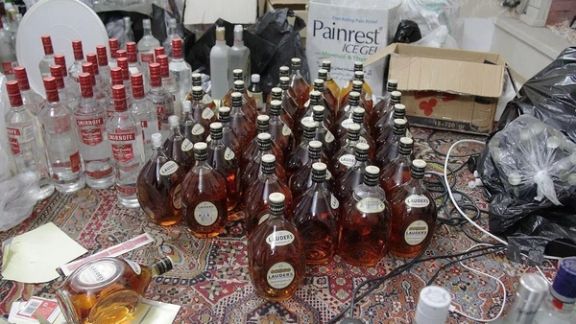
Amid surging cases of alcohol poisonings, Iran’s deputy health minister has urged a crackdown on counterfeit alcohol distributors.

Amid surging cases of alcohol poisonings, Iran’s deputy health minister has urged a crackdown on counterfeit alcohol distributors.
Saeed Karimi said, "We request the judiciary to deal with those who intentionally distribute fake alcoholic beverages, as equivalent to murder."
Demonstrating the extent of the problem spiraling across the country, he said, "There have been so many alcohol poisonings that numerical statistics are no longer important, and it is important to prevent them from happening."
For decades, alcohol poisoning caused by the consumption of counterfeit alcoholic beverages has plagued Iran, leading to fatalities, blindness, and serious injuries. Despite the Islamic regime's prohibition on alcohol, a recent survey by Iran Open Data revealed that half of all adults continue to regularly consume alcohol, often turning to homemade beverages to circumvent the ban.
Over the past three months, Iranian cities have experienced a distressing wave of alcohol poisonings, resulting in an average of around 10 hospitalizations and deaths per day, as reported by local news outlets. Methanol, a toxic compound found in homemade distilled alcohol and counterfeit brand bottles, is the primary culprit behind the alarming increase in poisonings.
These incidents have shed light on the complex relationship between Iran's religious regulations and the personal lives of its citizens. Many Iranians view these deaths as emblematic of the intrusion of religious rules into their daily routines and freedoms.
A 2018 report by the World Health Organization (WHO) placed Iran ninth out of 189 countries in terms of alcohol consumption per capita, underscoring the persistence of alcohol consumption despite the state's ban.
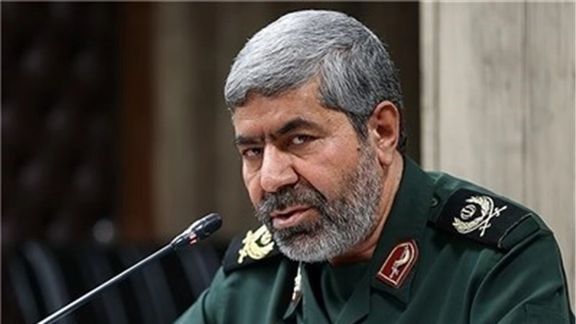
The Revolutionary Guard (IRGC) has threatened to respond in kind if the United States seizes Iranian vessels, as the US has augmented its forces in the Persian Gulf.
Speaking at a ceremony on Monday, spokesperson of the Guards, Ramazan Sharif claimed that Iran’s military power is at a level to confront the United States.
“The enemies of the Iranian nation are well aware of its power, especially its military capabilities to confront all threats and plots. We remind once again that mischiefs by America will be met with reciprocal action of the Islamic Republic,” Sharif said.
Iran attempted to seize two commercial vessels in early July in the Persian Gulf but was met with a US response and withdrew, according to the Pentagon. Tehran has harassed or seized more than 15 commercial ships in the past two years in the general area of the Persian Gulf.
Anticipating more Iranian action, the White House announced in May that the Biden administration would be making moves in the region, but at the time did not say what they would include.
Later, the Pentagon began to augment the US military presence in the region by deploying F-16 and F-35 warplanes in July and also dispatching three additional naval vessels carrying more than 3,000 sailors, including Marines.
The forces from the Bataan Amphibious Ready Group (ARG) and 26th Marine Expeditionary Unit (MEU) that sailed in mid-July from bases in the US reached the Red Sea on Monday.
Last week, the Pentagon said it is ready to offer onboard armed protection to commercial vessels in the region. Media in Tehran characterized this move as unprecedented and headlines appeared flagging higher chances of a military clash.
Ramazan Sharif in his speech underlined that “We thank the Almighty that Islamic Iran has reached such a degree of power that it is capable of confronting every American mischief, such as responding in kind and seizing their vessels.”
In April, US seized an Iranian oil tanker and in the past it has also confiscated cargos from tankers carrying sanctioned Iranian oil.
In recent months, many media reports have spoken of secret diplomatic efforts to control the tensions with Iran, including releasing Tehran’s frozen funds from countries such as Iraq and South Korea in return for a pledge by Iran not to further increase its uranium enrichment to weapons grade levels.
So far, except a US sanctions waiver to Iraq for a partial release of funds no changes have taken place. Parallel to discussions about Iran’s nuclear program, the US is also trying to secure the release of several American dual-nationals held hostage in Iran. Apparently, the release of $7 billion held in South Korea is the price for releasing the prisoners. But a new complication has emerged with reports that while talks were taking place, Tehran arrested two more individuals, bringing the total to five hostages.
Reporters on Monday pressed the State Department spokesperson Matt Miller for clarification if a fifth person has been seized, but he refused to confirm the news, which was reported by a local newspaper in Iran.
After more than two years of attempting diplomacy with the Islamic Republic, the Biden administration is coming under pressure by its critics, who demand a tougher posture toward Iran and a more vigorous enforcement of economic sanctions.
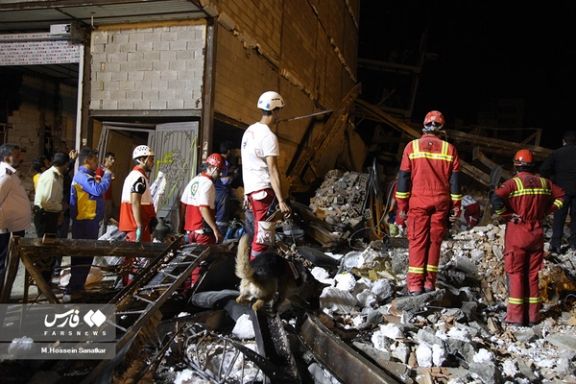
Shocking new footage has surfaced, depicting a devastating sequence of building collapses in southern Tehran on Sunday, resembling a grim cascade of falling dominoes.
The calamity has resulted in the tragic loss of five lives, including two police officers who were overseeing the legal demolition of a structure.
The incident unfolded as five buildings, each in various stages of construction, crumbled to the ground in southern Tehran, leaving a trail of destruction. At least three individuals lost their lives, and over 10 others sustained injuries, further highlighting the severity of the catastrophe.
Tehran's Firefighting Organization revealed on Sunday that among those affected were four police officers and two municipality employees. Additionally, several individuals were trapped beneath the debris, prompting a race against time to effect their rescue.
Tragically, three lifeless bodies, including those of Major Hossein Esmaili and Colonel Yazdan Soleimanabadi, have been recovered from the wreckage. Efforts to identify the third victim, an elderly man, are ongoing as rescue operations persist at the site. Regrettably, the fate of at least two individuals remains uncertain, as rescue teams continue their painstaking efforts.
This harrowing event has cast a harsh light on the concerning prevalence of high-risk buildings within Tehran. While officials have refrained from publicizing a comprehensive list to avoid causing undue alarm, last year's disclosure of 129 unsafe structures by Ensaf News and the subsequent report by the IRNA state news agency in June, stating a staggering count of "33,000 unsafe buildings" in Tehran, underscore the gravity of the situation.
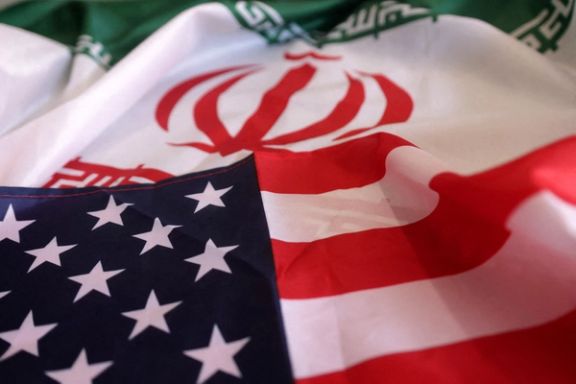
An Iranian-American woman known for her NGO work in Afghanistan has been arrested in Iran, intensifying diplomatic tensions, a government newspaper reported.
The arrest has prompted the United States to suspend the implementation of a planned prisoner swap deal with Tehran, as reported by Iran's state-run Khorasan newspaper.
The woman's identity has not been disclosed, with sources citing the need to protect ongoing negotiations over her release. This latest arrest follows the detention of a fourth US national in Iran, as previously reported by Semafor news website. The inclusion of this new case has now become a pivotal element in the escalated negotiations between the two nations.
Efforts to secure the release of American citizens held in Iran have been ongoing, with previous detainees including Siamak Namazi, Emad Sharqi, and Morad Tahbaz. The Biden administration has pursued the return of these individuals who have been held on alleged espionage charges that have been widely criticized as lacking credible evidence.
Iran seeks the release of its citizens convicted of crimes in Western countries, while the United States seeks the return of its nationals detained in Iran and access to frozen funds totaling billions of dollars held in overseas banks.
Tensions have escalated further due to Iran's recent arrest of the fourth and now fifth US citizens, disrupting the progress toward a potential agreement. Sources close to the situation indicate that the fourth American detainee was intended to be part of the exchange deal, potentially prompting Iran to adjust its demands.
While Iran maintains that its policy does not involve hostage-taking, human rights organizations have raised concerns about the country's track record of detaining dual nationals and foreigners on questionable grounds. Official figures of Iran's diplomatic hostages are unknown, but it is believed it spans a vast array of countries globally.
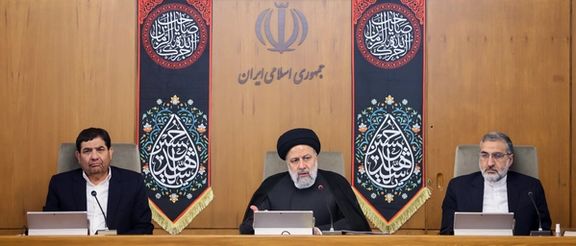
As President Ebrahim Raisi’s second year in office ended on August 5, the Iranian press found a chance to remind him that he has completely failed the voters.
The Jomhouri Eslami newspaper, a conservative daily critical of Raisi's economic and foreign policies throughout the past two years, stated that halfway through his presidency, Raisi can no longer blame the previous government for his failures. The daily also reminded that unlike his predecessors, Raisi enjoyed Supreme Leader Ali Khamenei's wholehearted support and had likeminded conservatives dominating the other branches of the government supporting him.
The daily went on to say that despite what Raisi thought during his first days in office, by now he must know that no one can run the affairs of the state without a balanced foreign policy. He should also realize that Iran's membership at the Shanghai Cooperation Organization and his government's ties with China, Russia, and some Latin American and African states have not helped the people and could be even harmful to the economy.
An 83-percent increase in printing money, a 95-percent rise in the rate of exchange for the US dollar and a 114-percent price increases for essential goods also show that Raisi and his colleagues have no true understanding of the country's situation and the impact of foreign policy on worsening conditions, the daily added.
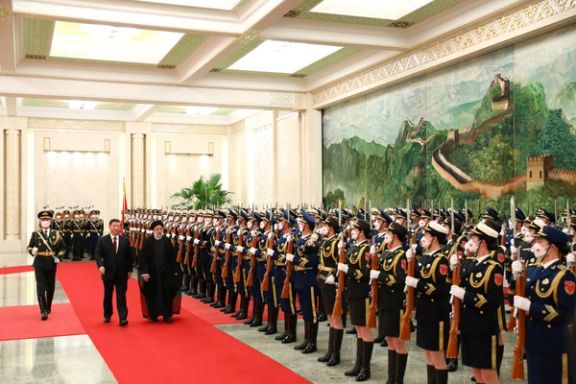
The issue of the regime’s anti-West foreign policy and its failure to resolve the nuclear dispute with the United States have become key issues in recent months as US sanctions cripple the economy.
Centrist daily Ham Mihan published analysis by several experts about Raisi's dismal record. The daily wrote that he has badly failed in controlling inflation and meeting his promises to create one million jobs and build one million homes every year.
Ham-Mihan noted that Raisi had to reshuffle his economic team several times during the past two years to no avail, and the performance of his economic team cannot be defended. As an example, Ham-Mihan noted that the US dollar has nearly redoubled during the past two years against the rial, which has fallen from 250,000 per dollar to nearly 500,000.
The experts told Ham-Mihan that Raisi has failed to facilitate growth for businesses. The experts also criticized the Raisi administration for not having any economic plans, and for making bureaucracy more complicated than it used to be. Even projects such as selling government assets have not met their objectives, because instead of leading to productivity they simply maximized the profits of insider groups.
The experts charged that there is no prospect for any improvement in the economy, which the government is simply unable to manage. They attributed that to "The President's inefficiency, the conflicts of interests between various groups of his supporters and more conflicts among various parts of the government."
Meanwhile, in a report on the state of the economy halfway through Raisi's presidency, economic daily Donya-ye Eghtesad wrote that Raisi should re-consider and review all of his policies for the second half of his presidency. "The inflation rate, lack of economic growth, the high risks involved in doing business in Iran, and low investment rates are among the problems that need to be tackled," the daily wrote.
While the inflation rate was 14.7 percent in the first year and 12.7 percent in the second year of President Hassan Rouhani's presidency, the Raisi administration has been struggling with a 49.1% inflation rate in its first year and a 39.4% inflation rate in its second year, the paper said, citing official figures considered by experts to be too low.
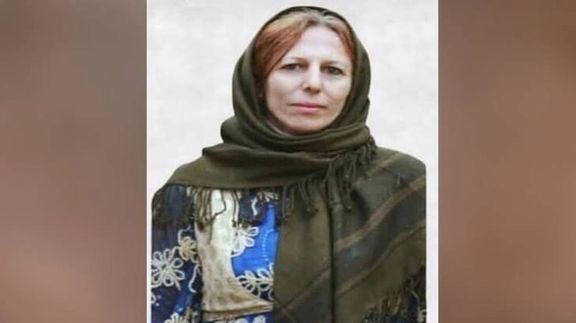
In a protest against her confinement, Soheila Mohammadi, an Iranian political prisoner, has embarked on a hunger strike by sewing her lips together.
Norway-based human rights group, Hengaw, reported that Mohammadi, a resident of Salmas city in the western Azarbaijan province, initiated her hunger strike within the women's ward of Urmia Central Prison on Saturday. Mohammadi's protest aims to draw attention to her situation and the conditions faced by herself and fellow inmates.
Despite serving three years of her five-year sentence, Mohammadi has been denied the right to parole and leave. An informed source quoted by Hengaw disclosed that even her request for a meeting with the prosecutor has been obstructed by the prison authorities.
This is not the first time Mohammadi has resorted to drastic measures. Earlier this year, she was reported to have attempted suicide due to the pressures exerted by government security institutions, which hindered her chances of being granted leave.
Mohammadi's arrest dates back to the autumn of 2020 when she was apprehended by intelligence forces of the Islamic Revolutionary Guard Corps in Salmas. Following several months of interrogation, she was transferred to the women's ward of Urmia Central Prison. She was subsequently sentenced to a five-year imprisonment term on charges of "membership in the Kurdistan Free Life Party (PJAK)" by the Revolutionary Court of Urmia.
Mohammadi's case highlights the mounting pressure on Kurdish civil groups and activists, particularly in the wake of the recent "Woman, Life, Freedom" protests. These demonstrations have drawn increased attention to the plight of Kurdish individuals and groups advocating for their rights and freedoms within Iran.